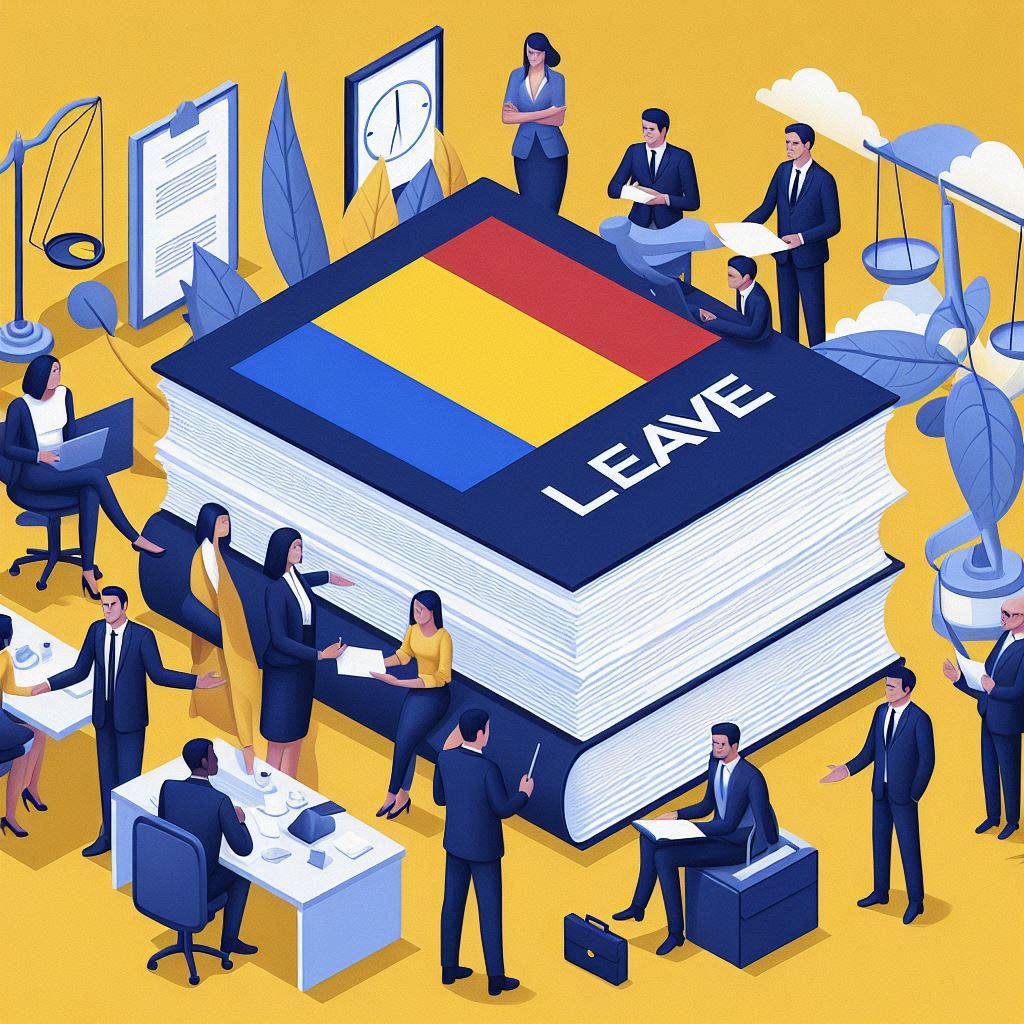Paid vs. Unpaid Leave: Key Differences and Employee Rights in Romania
Paid vs. Unpaid Leave: Key Differences and Employee Rights in Romania
Are you an employee in Romania and you want to know your rights to paid and unpaid leave?
Both types of leave have their benefits, but knowing the differences can help you use your time off well.
This article will cover the main points of paid and unpaid leave in Romania.
We’ll talk about your legal rights and what your employer must do.
Did you know you’re entitled to at least 20 days of paid annual leave in Romania, whether you work full-time or part-time?
But often, employers give you more, knowing how important it is to balance work and life.
So, what makes paid and unpaid leave different in Romania?
Let’s find out.

Overview of Paid and Unpaid Leave in Romania
The Romanian Labor Code sets clear rules for paid and unpaid leave.
Workers get various leave benefits like annual, sick, maternity, and special event leaves.
Employers often give more leave than the law requires.
Definitions and Legal Framework
The Romanian Labor Code explains the types of leave and how they work.
Paid leave means you get your regular salary while off work.
Unpaid leave is when you don’t get pay, but it depends on the employer and employee agreeing.
Types of Paid Leave: Annual, Sick, Maternity, and More
- Annual leave: Workers get at least 20 days of paid leave each year, based on how long they’ve worked.
- Sick leave: The first 5 sick days are paid by the employer. After that, the National Health Fund helps with pay up to 180 days.
- Maternity leave: Pregnant women get 126 days of paid leave for maternity. They can also take leave to care for sick or disabled kids.
- Other paid leaves: The law also covers paid leave for things like marriage, having a child, and when a family member passes away.
There’s also unpaid leave, which the employer and employee agree on. This type of leave helps with personal or family matters.

Paid vs. Unpaid Leave in Romania
In Romania, the main difference in employee leave is if the employer must pay the employee.
Paid leave, like annual, sick, and maternity leave, means the employer pays the salary.
The state also covers some of it.
Unpaid leave stops the job contract and the employer’s pay, but the employee might still get some benefits.
Romania’s statutory paid leave includes:
- At least 20 working days of paid vacation leave each year for everyone
- Up to 18 months of carry-over for unused vacation leave to the next year
- Employers must pay employees their regular salary before the leave starts, at least five working days early
- 126 days of paid maternity leave for female employees
- 10 working days of paid paternity leave, more if they take a childcare course
- 5 days of paid leave for an employee’s marriage
Unpaid leave in Romania is for personal reasons, training, or special situations.
The time off is set by the collective labor agreement or company rules.
Employees can take unpaid parental leave for up to two years per child, or three years for children with disabilities.
Understanding the key distinctions between paid and unpaid leave in Romania is crucial for knowing your entitlements and employer obligations.
Understanding leave policies well can help employees make better choices and get the benefits they deserve.
Annual Paid Leave Entitlements in Romania
In Romania, workers get at least 20 paid vacation days each year.
They must be paid their usual salary for vacation five working days before they start.
Also, they get paid for any vacation days they didn’t use when they leave a job.
Minimum Statutory Requirements
All full-time and part-time workers in Romania get a minimum of 20 annual paid leave days.
These days are given based on the hours worked.
Often, employers give more days as a bonus.
Carrying Forward Unused Leave
Workers can keep unused vacation days for up to 18 months.
But, they must use at least one part of their leave as a two-week break.
Employers must make a leave schedule for the next year.
This schedule will show either exact dates or periods for vacation days.
| Vacation Days in Romania | Paid Leave Policy |
|---|---|
| Minimum 20 working days per year | Salary paid at least 5 days before leave |
| Unused leave can be carried over up to 18 months | Employers must provide vacation schedule |
Sick Leave Policies and Compensation
In Romania, employees can take paid sick leave with a doctor’s note.
They can take leave for many reasons, like normal work incapacity, surgery emergencies, COVID-19, maternity, or caring for a sick child.
To get paid sick leave, they must have paid social contributions for at least 6 months in the last year.
Coverage and Eligibility Criteria
The National Health Insurance Fund covers sick leave in Romania.
To qualify, employees need to have paid into the social security system for 6 months recently.
The employer pays for sick leave first and then gets reimbursed by the National Health Insurance Fund.
Calculation of Sick Leave Pay
The pay for sick leave in Romania depends on the employee’s income before they got sick.
The pay can be 75% to 100% of their average income.
For instance, if someone makes RON 3,300 a month and takes sick leave, they could get between RON 2,475 and RON 3,300, based on their illness.
| Sick Leave Reason | Sick Leave Pay Coverage |
|---|---|
| Normal work incapacity | 75% of average income |
| Surgical emergencies | 100% of average income |
| COVID-19-related illness | 100% of average income |
| Maternity | 100% of average income |
| Caring for a sick child | 85% of average income |
Employers in Romania must pay social security and taxes for their employees, even when they are on sick leave.
The employer pays the sick leave first and then gets back money from the National Health Insurance Fund.
Maternity and Parental Leave Benefits

Pregnant employees in Romania get a lot of support for maternity leave.
They can take up to 126 calendar days off, starting before the baby arrives and going after.
They must take at least 42 days off after the baby is born.
During this time, they get 85% of their pay from the last 6 months.
Paternity Leave and Child Care Leave Provisions
Dads in Romania can also get paternity leave.
They can get up to 10 paid days off, and another 5 if they have a baby care certificate.
Plus, parents can take child care leave until the child is 2 (or 3 if the child has a disability).
This leave can be shared between both parents.
These maternity leave Romania and paternity leave rights help new parents a lot.
They make sure parents can balance work and family life.
The parental leave in Romania shows the country cares about families and kids’ well-being.
Unpaid Leave Regulations and Procedures
In Romania, workers can ask for unpaid leave for personal reasons.
This means they don’t work and don’t get paid.
The length of unpaid leave depends on the company’s rules, usually up to one month a year.
Reasons for Unpaid Leave
People take unpaid leave for many reasons.
They might want to go back to school, take care of a family member, or follow their interests.
The unpaid leave regulations Romania make sure workers’ rights are looked after.
Requesting and Obtaining Unpaid Leave
- Workers need to ask for unpaid leave a month before, saying when they want to start and end, and why.
- Employers can only say no if the worker’s absence would really hurt the business, as the leave of absence laws in Romania say.
- How long unpaid leave entitlements last is up to the company’s rules and any group agreements.
Unpaid leave policies in Romania give workers a break, but they must follow the right steps and talk to their bosses.
This helps everything go smoothly and prevents problems.
Employee Rights and Employer Obligations
Romanian labor laws protect employees from discrimination and retaliation when they take leave.
Employers can’t fire an employee for six months after they come back from child care leave or while they get the insertion bonus.
This rule makes sure employees aren’t punished for taking leave.
When an employee comes back from leave, they must go back to their old job or a similar one.
They will have the same or better work conditions.
This rule keeps their job safe and helps them keep moving forward in their career, even after taking time off for personal or family reasons.
Protections Against Discrimination and Retaliation
The employment legislation in Romania clearly says employers can’t discriminate against or punish employees for taking leave.
If an employee faces bad treatment, like being demoted or fired, for using their employees rights in Romania, they can complain and seek help.
Reinstatement After Leave
According to the labor laws Romania, employers must put employees back in their old job or a similar one when they return from leave.
This rule makes sure employer responsibilities leave Romania are followed.
Employees can go back to work without any problems with their career or pay.
| Key Employee Rights and Employer Obligations in Romania | Details |
|---|---|
| Protection Against Discrimination and Retaliation | Employers are prohibited from dismissing an employee for six months after their return from child care leave or during the time they receive the insertion bonus. |
| Reinstatement After Leave | Employees are entitled to be reinstated in their previous or an equivalent position upon returning from leave, with the same or better employment conditions. |
Conclusion
The Romanian Labor Code sets clear rules for paid and unpaid leave.
It helps employees balance work and personal life. Employers must give leave, figure out pay, and protect workers’ rights.
Our team of Romanian lawyers can give better advice and protect everyone’s interests by staying updated on labor laws.
As Romania’s economy changes, clear leave policies become more important.
Understanding the Romanian Labor Code and keeping up with new laws helps manage leave well.
This way, you can keep your team happy and productive in Romania.
FAQ
What is the legal framework for paid and unpaid leave in Romania?
The Romanian Labor Code outlines the rules for different types of leave.
This includes annual, sick, maternity, and special event leaves.
It ensures a minimum amount of leave for everyone.
Employers often give more leave than the law requires.
What are the key differences between paid and unpaid leave in Romania?
Paid leave means the employer pays the employee even when they’re not working.
This includes annual, sick, and maternity leave.
The state helps cover some of the salary.
Unpaid leave means the employee doesn’t get paid but might still have some benefits.
What are the statutory requirements for annual paid leave in Romania?
All full-time and part-time workers in Romania get at least 20 days of paid annual leave.
This leave builds up over the year.
Employers usually give more than the law says.
Workers can save up to 18 months of unused leave, but must use at least one two-week block.
How does sick leave work in Romania?
Sick leave in Romania is paid with a doctor’s note for valid reasons like illness or caring for a sick child.
You need to have paid social contributions for 6 months to qualify.
The pay varies by illness type, covering 75% to 100% of your previous income.
What are the maternity and parental leave benefits in Romania?
Pregnant women in Romania get 126 days of maternity leave, starting before the birth and ending after.
They must take at least 42 days after the birth. They get 85% of their previous income during this time.
Men can take up to 10 days of paternity leave, plus 5 more with an infant care certificate.
Parents can take child care leave until the child is 2, or 3 if disabled.
This leave can be shared between parents.
How does unpaid leave work in Romania?
Employees can take unpaid leave for personal reasons, which pauses their job and stops their pay.
The longest unpaid leave is up to the employer’s rules, usually one month a year.
They must ask a month ahead of time, explaining why they need the leave.
What are the employee rights and employer obligations related to leave in Romania?
Romanian laws protect employees from being unfairly treated when they take leave.
Employers can’t fire someone for six months after they return from child care leave.
When employees come back from leave, they must go back to their old job or a similar one, under the same or better conditions.



